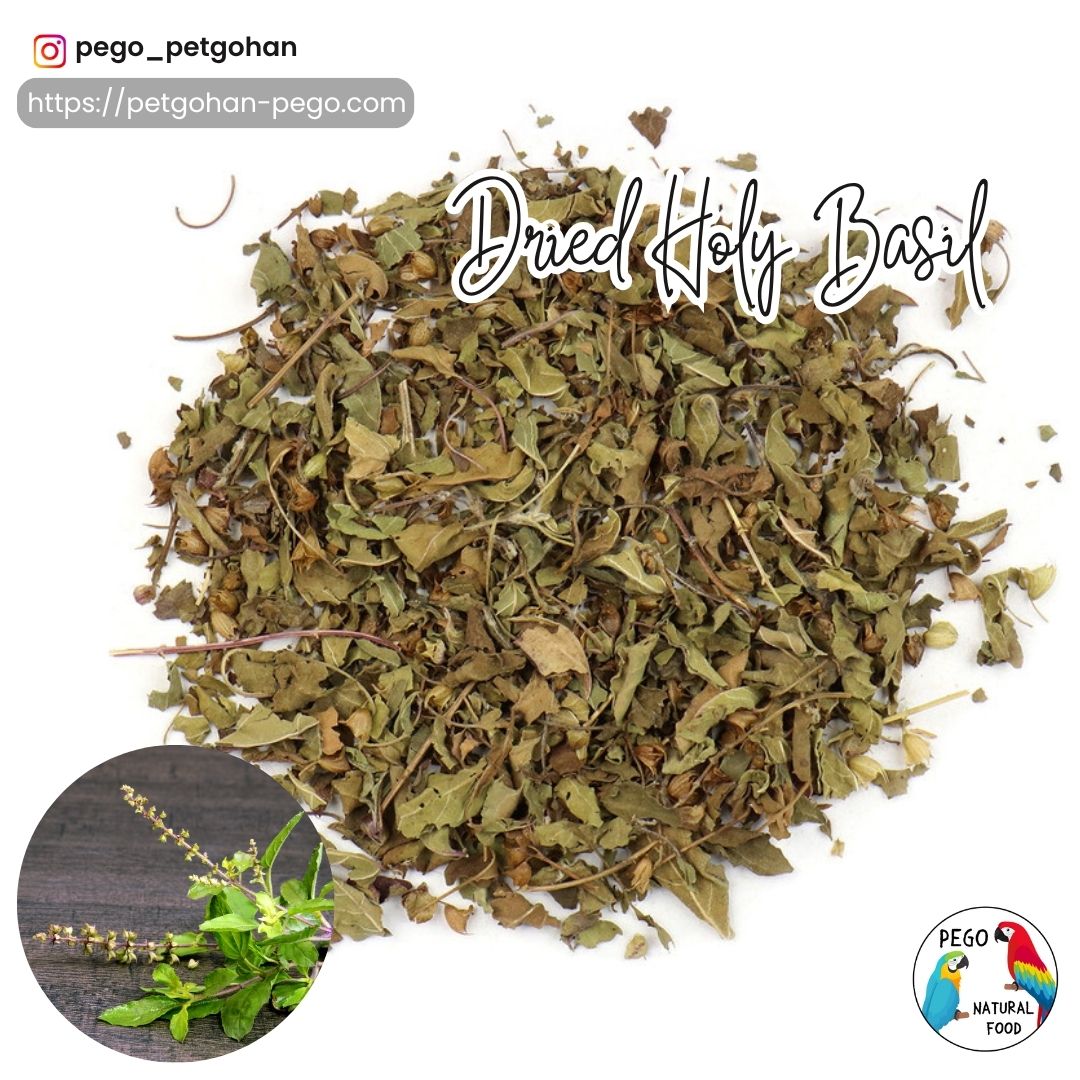
Dried Tulsi/Holy Basil
Taxes inclues
A powerhouse herb known for antioxidants, minerals, and daily balance.
Dried tulsi (holy basil) is an aromatic herb used to add herbal diversity beyond seeds and vegetables.
Its distinctive fragrance and leaf texture allow birds to engage through scent, taste, and foraging interaction when offered whole, crumbled, or mixed into meals. As an herb-based ingredient, tulsi is often chosen to expand ingredient rotation and support varied feeding routines, and is widely known for its naturally occurring vitamins, minerals, antioxidant compounds, and use in balance-conscious, whole-food–focused diets.
This product is suitable for:
- Diets incorporating herbs as a separate food category
- Birds that benefit from foraging-style feeding
- Seed-based, pellet-based, or mixed diets
- Ingredient rotation focused on aroma and texture variety
- Caregivers seeking whole-leaf herbal additions
This product can also be fed to lories and lorikeets.
Please note: Because this product is packaged as-is at the farm in the U.S., small foreign materials such as bits of paper may occasionally be present. The manufacturer has confirmed that this does not qualify for returns under their quality standards. Please purchase only if you are comfortable with U.S. inspection standards.
Product Overview
Certified
USDA Certified Organic.
Grown without synthetic pesticides, fertilizers, GMOs, non-organic seed stock, or irradiation.
Certified Kosher with “Pareve” status by Earth Kosher, one of the leading international certification agencies.
SQF certified, meaning that the warehouse and processing facilities are certified under the Food Safety Code for Manufacturing. This certification reflects a strong commitment to food safety, quality, and excellence in ingredient sourcing, processing, and storage.
Parrot Species
Suitable for all bird species, including finches, small parrots, medium parrots, large parrots, and lorikeets.
It can also be offered to small animals, but please use your discretion as the owner.
What Are Whole Foods?
In bird nutrition, “whole foods” are ingredients that wild birds could obtain in nature—fresh vegetables and fruits, seeds, nuts, herbs, coconut, edible flowers, insects, and items that are soaked or sprouted. In short, foods you can recognize at a glance. With the exception of processed products such as pellets, supplements, and bird cookies, most of these are considered whole foods. (Seeds count as whole foods, too.)
Feeding Instructions
Ways to serve (examples):
・Serve as-is
・Grind into a powder
・Sprinkle and mix into the regular diet
・Brew as an herbal tea (hot)
・Cold-brew as an herbal tea
・Use as a foraging enrichment material
When used as part of meals and mixed with other foods, offering about 2–5 times per week is fine. However, we don’t recommend large quantities. As with any food, moderation is best.
Feeding Amount

Offer a small amount a few times a week as part of your bird’s regular diet. We recommend giving it as part of a blend rather than on its own. This product is one of the best options for birds.
Storage Instructions
Store at room temperature, away from heat and humidity. Once opened, use promptly; reseal the zipper closure tightly or transfer to an airtight container. For reference, our team keeps them in airtight jars from IKEA.
Ingredients
Organic Dried Tulsi(Rama Holy Basil)
Nutritional Benefits
Rich in vitamins K, A, and C
Rich in minerals such as calcium, magnesium, iron, and manganese
Powerful antioxidant properties
Anti-inflammatory effects
Immunomodulatory and antimicrobial properties
Supports healthy blood sugar and lipid metabolism
Best-By Date
JAN 2027
FAQ
We haven’t received any questions about this product yet.
Caution
The information on this page regarding nutrients, benefits, and other characteristics (including commonly stated effects) is provided as general, publicly known information about each ingredient. It does not guarantee any specific effects or results of this product.
In the United States, the Food and Drug Administration (FDA) sets maximum “defect action levels” for incidental insect matter, and those limits vary by food type and manufacturing process. Because this product uses pesticide-free ingredients and contains no additives, incidental insects may occasionally be present. Insects associated with produce or herbs (i.e., whole foods) are a natural source of animal protein and are generally not harmful to birds; however, please remove them if you prefer. Returns or exchanges cannot be accepted for issues related to incidental insects.

Le texte de ce site est généré automatiquement par un outil de traduction et peut contenir des formulations peu naturelles. Merci de votre compréhension.
